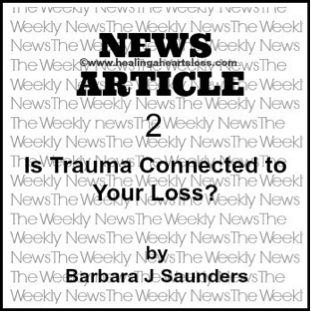Sometimes there appear to be valid reasons for being stuck in grief.
You might ask what a reason for being stuck is;
- Fear of forgetting that person
- Time to “be” with the sadness
- Complicated issues associated with the grieving process
- Being supported by others who are also stuck in their grief
- There may be a trauma component connected to the loss
- Past trauma and losses resurface with this recent loss
A loss may be traumatic for an individual without being specifically defined as traumatic loss. One person’s experience may not be the same as someone else’s when considering how traumatic a loss is.
The grief associated with traumatic loss can be a separate issue from the actual loss. In many cases the trauma of the loss needs to be healed or dealt with before the loss can be mourned and grieved effectively.
Grief defined as the inward expression of loss; which can be mental, emotional, physical, spiritual or psychological. Grief can have all or some of the following; anxiety, despair, inability to eat, over eating, chest pains that feel like your heart is breaking, fear, pain, exhaustion and more.
Traumatic loss has numerous components that could be similar to other problems. A traumatic loss can be unexpected, untimely and sometimes connected with horrific or frightening situations.
When grief reactions seem prolonged and continue to cause problems with daily functioning; where the individual is unable to use their resources or have no resources to effectively cope with the loss, there may be a need for a professional diagnosis. How do you get help for traumatic loss?
- Talk with someone, tell your story and in many case tell your story several times
- Be open to the possibility of trauma being a component of loss but know, not all losses have a trauma component
- Seek professional help from someone who deals with trauma and grief loss. There are many different ways to heal from traumatic and not all professionals know everything. Seek out the professional that works the best for you. Remember, different strokes for different folks.
Professionals know what to look for when someone talks about their loss and are able to identify areas of concern.
I have briefly touched on topics that have multiple aspects to consider. There is no one size fits all solution, for some individuals there may be the need to seek other options. Do not stop looking for the support you need.
There are many options available a few in no special order are; Cognitive Behavioural Therapy (CBT), Trauma Incident Reduction (TIR), Eye Movement Desensitization and Reprocessing (EMDR), Intuitive Healers, Equine Therapy and more.
Sometimes, when an individual is in the midst of their grief they may not see what others see and may be defensive if someone mentions there is a problem, be supportive in any way possible. Barbara J. Saunders is a grief counselor/Thanatologist

